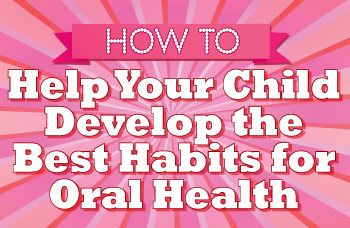How to Help Your Child Develop the Best Habits for Oral Health
From tooth-brushing for your toddler to helping your teenager stay away from tobacco, here are the most important tips for healthy habit formation through childhood and beyond

Most people don't give a lot of thought as to how habits — both healthy and unhealthy — are formed. Here's a simple definition of the word habit: a recurrent, mostly unconscious pattern of behavior that is acquired through frequent repetition. But there is a lot more to it, as we'll see.
Behaviors and the habits upon which they are based derive from attitudes and values (both personal and cultural), awareness and knowledge, even feelings. They often begin with parents and families sharing their perceptions of what constitute good habits. As they grow, children share behaviors and habits with their peers. This process continues through adolescence as kids change physically and emotionally; and so on. Health professionals also play a crucial role in developing health-promoting behaviors and healthy habits.
Oral Hygiene Behavior and Habit Formation
Many reasons, such as having a nice smile and fresh breath, may be cited for developing good oral hygiene habits. From a scientific perspective, however, there is one primary reason for brushing and flossing teeth: to effectively remove the film of bacteria that collects along the gum line, and in the nooks and crannies of teeth. Effective daily removal of this biofilm, throughout a lifetime, will contribute to lifelong dental health more than anything else.

Believe it or not, developing healthy oral hygiene behavior, unlike other behavior modifications, is one of the easier habits to instill. This is a behavior that can be shaped over time; it will change with your child's age, dexterity, awareness and learning. The time to start it is as soon as the first baby teeth appear. A parent or caregiver should use a clean, damp washcloth to gently wipe the infant's teeth. Starting at age 2, when there are more teeth in the mouth, a brushing routine should be established using a smear of fluoride toothpaste. For toddlers, parents can use a child's size soft toothbrush with water and a pea-sized amount of fluoride toothpaste. Children need help brushing until at least age 6, by which age they have generally developed more dexterity. They can take over brushing by themselves and also learn to floss.
Tip 1: Teach your children how to check the cleanliness of their own teeth.
Teach your children to check how well they are brushing by running their tongue over their teeth. If the teeth feel nice and smooth, it's a job well done. It's quite easy for your teeth to feel as clean as when you walk out of your dentist's office. Use a children's size soft, microfine, multituft brush. Hold it on the gum line and gently wiggle the brush back and forth until the tooth surfaces feel clean — right down to the gum line. Then clean across the biting surfaces. Keep in mind that it doesn't take a lot of pressure to remove biofilm. Being gentle will also ensure that you don't damage the soft gum tissues.
Tip 2: Avoid transferring your own oral bacteria to your children.
Keep in mind that children are not born with decay-producing bacteria, which are transferred from parents and caregivers. That's why sharing a baby's spoon, kissing a baby on the lips or licking a pacifier to clean it is never a good idea. Also make sure you are in good dental and oral health yourself.
Healthy Dietary Habits
Food not only nourishes us, it is a large part of our society and culture. While nutrition is the end effect of food in the body, diet is about developing healthy eating habits.
A healthy diet is one that includes all the essential nutrients in appropriate amounts to promote health and growth — and prevent disease. Using a guide (www.choosemyplate.gov) is very helpful in establishing healthy eating habits during life's different stages. A healthy diet is based on the concepts of:
- Variety. Choose a number of different foods as no single food can meet all of the daily nutrient requirements.
- Balance. Eat appropriate amounts of food from the recommended food categories on a daily basis.
- Moderation. Consume foods and beverages in serving sizes that are appropriate to meet energy needs while controlling calories, total fat, cholesterol, sodium, and sugars. Moderation is vital to maintaining a healthy weight; it also may help protect against chronic diseases such as heart disease or cancer.
What your child eats during infancy through early adulthood will have profound consequences for health in later life, so start healthy eating behaviors and habits early.
Tip 3: Set an example of healthy eating habits for your children.
Remember these simple guidelines in your pursuit of healthy eating habits and good nutrition:
- Follow a guide (see www.choosemyplate.gov) for your age, gender, exercise, and calorie needs;
- Eat sufficient amounts of whole grains, fruits, vegetables, protein foods and calcium/phosphorous sources every day;
- Maintain variety, balance, and moderation in your food choices;
- Drink plenty of water;
- Restrict sweets to meals and dessert — avoid sugary snacks between meals;
- Limit your total sugar intake to no more than 10 teaspoon equivalents per day;
- Snack freely on fresh fruits and vegetables, low fat cheeses, whole wheat crackers or low-fat dairy products;
- Exercise regularly and moderately.



